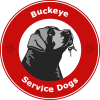Find answers to common questions we get. Don’t see your question here? Feel free to contact us and we’ll get back to you with an answer!
Who is eligible to receive a dog from BSD?
In general, you should meet the following criteria:
- Have specific physical and/or therapeutic need that a dog could fulfill.
- Have a strong desire to have an assistance dog.
- Be willing and able to follow simple instructions, practice with the dog, and in general work hard at making the team a success.
- Have a support system of family, friends, and/or staff that is committed to helping the team succeed.
- All persons living with you must be strong supporters of your goal to receive a service dog.
How long with I have to wait to get a dog?
While many non-profits have waiting lists of 3-4 years, BSD’s goal is to get you the best dog possible as quickly as possible. Usually, it is around six months from the time you are approved to get a dog until you begin team training. Sometimes, it’s significantly sooner.
Do you specialize in a particular type of service dog?
BSD primarily places service dogs with persons with mobility impairments or service/therapy dogs with individuals with developmental disabilities. However, we also provide facility dogs, seizure dogs, and hearing dogs.
What's your experience with persons with disabilities?
For more than 30 years, Christy Talbert has worked with adults and children affected by various disabilities including deafness and deaf/blind, autism, MR/DD, accident victims, MD, MS, ALS, CP, and multiple disabilities. Christy is a former program manager for Franklin Co. MR/DD and a former program staff of Recreation Unlimited.
Will BSD train a dog I already own?
BSD may evaluate your own dog for training. However, in most cases, your dog will not be suitable for service work. Please do NOT go out and select a dog or puppy with the idea that it will become your service dog.
How will the dog placement be conducted? Will I have to travel?
One of the benefits of hiring a private trainer is that we are able to travel to your home. As part of the placement process, you will need to be able to transport to public locations in your area such as malls, restaurants, and parks.
Do placements ever fail? What then?
Placements can fail for a number of reasons. Sometimes there is a personality issue between the dog and client. Other times, some characteristic about the dog does not show itself until after the placement has begun. Non-compliance on the part of the client can also cause a team to fail. However, with an experienced trainer, this should happen very rarely (<5%). Except in cases of client non-compliance, BSD will work with the client to find a more suitable dog for their situation.
I have a pet dog / cat /giraffe. Is that ok?
So long as other pets are not aggressive toward the service dog, it is fine. Having young puppies in the home when a service dog enters is difficult for all involved, so we discourage acquiring a puppy before getting a service dog or during the team
How long have you personally been training service dogs?
Christy Talbert has more than 30 years training service dogs and has placed more than 200 teams. Christy also has extensive experience training trainers and volunteers.
Where do you obtain dogs for training?
BSD uses rescued and unwanted dogs. We carefully select animals from dog pounds and shelters across Ohio. Once a candidate is chosen, extensive behavioral evaluation occurs in the trainer’s home. All dogs receive thorough vet check, altering, and needed medical treatment.
Myself or someone in my home has pet allergies. Is it possible to get a low-shedding, low allergy service dog?
One of the benefits of working with BSD is our desire to match a dog to the needs of you and your household as well as possible. In response to the growing need for non-shedding dogs, we are providing standard poodles and labradoodles to families that request them. Depending upon availability, there may be an additional fee for a non-shedding dog, as they can be more difficult to obtain. If you desire a non-shedding dog, please let us know during your assessment interview.
